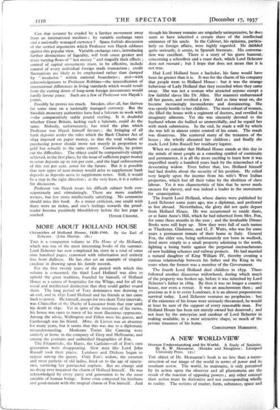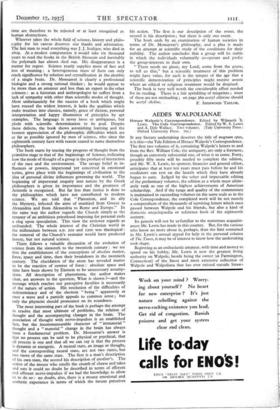A NEW WORLD-VIEW
THE object of Dr. Monsarrat's book is no less than a recon- struction of our image of the world in terms of power and its
resultant action. The world, he maintains, is only perceived by its action upon the observer and all phenomena are the result of the reaction of opposing powers ; any other concept than action must be derivative and not corresponding wholly to reality. The notions of matter, form, substance, space and time are therefore to be rejected or at least recognised as, human abstractions.
Whoever takes the whole field of science, history and philo- sophy for his canvas deserves our thanks and admiration. The lair man to read, everything was J. J. Scaliger, who died in 1609, At a modest computation it would take six thousand years to read the books in the British Museum and inevitably the polymath has almost died out. His disappearance is a matter for regret. Science yearly supplies more of fact and less of meaning a heterogeneous mass of facts can only reach significance by solution and crystallisation in the alembic of a _ single brain. Dr. _ Monsarrat is clearly a professional biologist and a strong rational thinker ; he would appear to be more than an amateur and less than an expert in the other sciences.: as a historian and anthropologist he suffers from a lack of sympathy with other than scientific modes of thought. Most unfortunately for the success of a book which might have roused the widest interest, it lacks the qualities which make treatises into classics, namely, grace of diction, personal interpretation and happy illustration of principles by apt examples. The language is never loose or ambiguous, but plods with scientific determination to its goal. Despite these defects, the book shows astonishing learning and the keenest appreciation_ of the, philosophic difficulties which are as far as possible ignored by men of science, who since the eighteenth century have with reason ceased to name themselves philosophers.
The book starts by tracing the progress of thought from the primitive stage to that of the beginnings of Science, indicating how the mode of thought of a group is the product of interaction of the race and the environment. The savage belief in in- fluences or powers, impersonal yet conceived in emotional terms, gives place with the beginnings of civilisation to the idea of personal divine influences governing the world. The beginning of impersonal enquiry into nature by the Greek philosophers is given its importance and the greatness of Aristotle is recognised. But far less than justice is done to the philosophies which have not contributed to modern science. We are told that " Platonism, and its ally the Mystery, infected the aims of mankind from Greece to Alexandria and from Alexandria to Rome and Europe." In the same way the author regards the Church simply as the tyranny of an ambitious priesthood imposing for personal ends a clog upOn speculation. This view the reviewer regards as unfounded. The whole interest of the Christian world in the millennium between A.D. zoo and 1200 was theological : the removal of the Church's restraint would have produced heresy, but not natural science.
There follows a valuable discussiOn of the evolution of science front the sixteenth to the twentieth century : we see first the establishment 'of the conceptions of absolute matter, force, space and time, then their breakdown in the twentieth century. The elucidation of the atom has revealed matter to be the reaction of centres of force : absolute space and time have been shown by Einstein to be unnecessary assump- tions. All description of phenomena, the author makes clear, are answers to the question, What is shown ?—and the message which reaches our perceptive faculties is necessarily of the nature of action. His resolution of 'the difficulties of indeterminacy and of the electron " being " apparently at once a wave and a particle appeals to common sense ; but only the physicist should pronounce on its soundness.
The most interesting part of the book is perhaps the attempt to resolve that most ultimate of problems, the relation of thought and the accompanying changes in the brain. The association of thought with nerve-impulses is an established fact, but the incommensurable character of " immaterial " thought and a " material " change in the brain has always been a fundamental problem. Dr. Monsarrat's answer is that no process can be said to be physical or psychical, that all process is one and that all. we, can say is that the process is dynamic or energetic. A mental state, an image or thought, and the corresponding neural state, are not two states, but two views of the same state. The first-is a man's description of his own state, the second his description of another's. The action of the mouse who smells the crumb of cheese and takes and eats it could no doubt be described in terms of afferent and efferent nerve-impulses if we had the knowledge to allow us to do so : no doubt, also, there is a mousy emotional and aesthetic experience in terms of which the mouse perceives his action. The first. is our description of the event, the second is. his description; but there is only one event.
The book ends by an examination of human societies in terms of Dr. Monsarrat's philosophy, and a plea is made for. an attempt at scientific study of the conditions for their stability. The author concludes .that a group will be stable in which the . individuals voluntarily co-operate and prefer the group-interests to their own.
" There needs no ghost, my Lord, come from the grave, to tell us this," but a scientific treatment of this problem might. have value, for such is the temper of the age that a scientific demonstration of principles might receive assent where an ethical or religious_ treatment would be despised.
The book is very well worth the considerable effort needed for its reading. There is a fair sprinkling of misprints ; most of these are not misleading ; on page 369 acetyl chlorine should















































 Previous page
Previous page